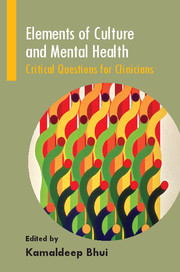Book contents
- Frontmatter
- Contents
- List of contributors
- Foreword: Desire and commitment: essential ingredients in learning about culture and mental illness
- 1 Is trauma-focused therapy helpful for survivors of war and conflict?
- 2 Will ethnopsychopharmacology lead to changes in clinical practice?
- 3 Does cognitive–behavioural therapy work for people with very different cultural orientations and backgrounds?
- 4 Can you do meaningful cognitive–behavioural therapy through an interpreter?
- 5 Are particular psychotherapeutic orientations indicated with specific ethnic minority groups?
- 6 Can psychotherapeutic interventions overcome epistemic difference?
- 7 On the role of culture and difference in evaluation, assessment and diagnosis
- 8 Necessary and sufficient competencies for intercultural work
- 9 On the validity and usefulness of existing Eurocentric diagnostic categories
- 10 Benefits and limitations of the cultural formulation in intercultural work
- 11 Barriers to the intercultural therapeutic relationship and how to overcome them
- 12 How does intercultural interpretation work in the mental health setting?
- 13 Do the power relations inherent in medical systems help or hinder in cross-cultural psychiatry?
- 14 Recovery and well-being: a paradigm for care
- 15 Social perspectives on diagnosis
- 16 Public mental health and inequalities
- 17 Can you do psychotherapy through an interpreter?
- 18 Can race and racism be acknowledged in the transference without it becoming a source of therapeutic impasse?
- 19 Cultural competence: models, measures and movements
- 20 Religion, spirituality and mental health
- Index
3 - Does cognitive–behavioural therapy work for people with very different cultural orientations and backgrounds?
Published online by Cambridge University Press: 01 January 2018
- Frontmatter
- Contents
- List of contributors
- Foreword: Desire and commitment: essential ingredients in learning about culture and mental illness
- 1 Is trauma-focused therapy helpful for survivors of war and conflict?
- 2 Will ethnopsychopharmacology lead to changes in clinical practice?
- 3 Does cognitive–behavioural therapy work for people with very different cultural orientations and backgrounds?
- 4 Can you do meaningful cognitive–behavioural therapy through an interpreter?
- 5 Are particular psychotherapeutic orientations indicated with specific ethnic minority groups?
- 6 Can psychotherapeutic interventions overcome epistemic difference?
- 7 On the role of culture and difference in evaluation, assessment and diagnosis
- 8 Necessary and sufficient competencies for intercultural work
- 9 On the validity and usefulness of existing Eurocentric diagnostic categories
- 10 Benefits and limitations of the cultural formulation in intercultural work
- 11 Barriers to the intercultural therapeutic relationship and how to overcome them
- 12 How does intercultural interpretation work in the mental health setting?
- 13 Do the power relations inherent in medical systems help or hinder in cross-cultural psychiatry?
- 14 Recovery and well-being: a paradigm for care
- 15 Social perspectives on diagnosis
- 16 Public mental health and inequalities
- 17 Can you do psychotherapy through an interpreter?
- 18 Can race and racism be acknowledged in the transference without it becoming a source of therapeutic impasse?
- 19 Cultural competence: models, measures and movements
- 20 Religion, spirituality and mental health
- Index
Summary
Cognitive–behavioural therapy (CBT) can be used across cultures, but only if appropriately adapted (Rathod et al, 2010). A personalised and pragmatic therapy, CBT uses reasoning to provide a conceptual framework of mental illness that is not inconsistent with Eastern and other philosophies (Rathod & Kingdon, 2009). The client (patient) and therapist develop a collaborative understanding of the client's perceived problems, so that a mutually respectful exploration of the problem can be developed to work on the issues identified (Bhui & Bhugra, 2004). The collaborative approach allows the patient to take an active role as an expert of their own culture and the therapist to personalise the therapy to the patient's needs.
People with depressive illness and anxiety usually have beliefs about the self, others and the world that are unhelpful. Cognitive–behavioural therapy involves exploration of these core beliefs and attempts to modify them, and there is a strong focus on involvement of the patient in the therapeutic process. However, core beliefs, underlying assumptions and even the content of automatic thoughts might vary with culture (Padesky & Greenberger, 1995). The practice of CBT without adaptation in minority groups can adversely affect the therapeutic alliance between patient and therapist and risks disengagement of patients from therapy (Rathod et al, 2005). In patients, this can lead to disappointment and loss of hope, particularly as people from ethnic minority groups are less likely to trust mental health services in the first place (Thornicroft et al, 1999). In therapists, a patient's disengagement might leave them feeling incompetent, especially if they do not understand the cultural issues involved.
Griner & Smith (2006), in their meta-analysis, provided suggestive evidence that culturally adapted interventions are effective. Some findings pointed to the possibility that clients who had the greatest need for accommodations (i.e. poorly acculturated, non-English-speaking adults) received the greatest benefit from such adaptations. Small pilots from many cultural groups have found adapted CBT to be successful in ethnic minority populations (Patel et al, 2007; Rojas et al, 2007; Rahman et al, 2008). Muñoz and colleagues have conducted a number of studies on the cultural adaptation of CBT for the treatment and prevention of depression in adults from ethnic minority groups in the USA (e.g. Kohn et al, 2002; Miranda et al, 2003; Muñoz & Mendelson, 2005).
- Type
- Chapter
- Information
- Elements of Culture and Mental HealthCritical Questions for Clinicians, pp. 12 - 16Publisher: Royal College of PsychiatristsPrint publication year: 2013



